What happens when plastics and pandemics collide? In a Let’s Talk it Over (LTiO) webinar, the Master of Environment and Natural Resources Management (MENRM) program led a discussion on the double whammy problem of the COVID-19 pandemic and plastic pollution. The webinar was live-streamed on 30 September 2020 via the University of the Philippines Open University (UPOU) Networks, UPOU Multimedia Center Facebook page, and UPOU YouTube channel.
The webinar talked about the recent information on the increase in plastic use due to the pandemic, and the solutions or initiatives being explored about it.
.
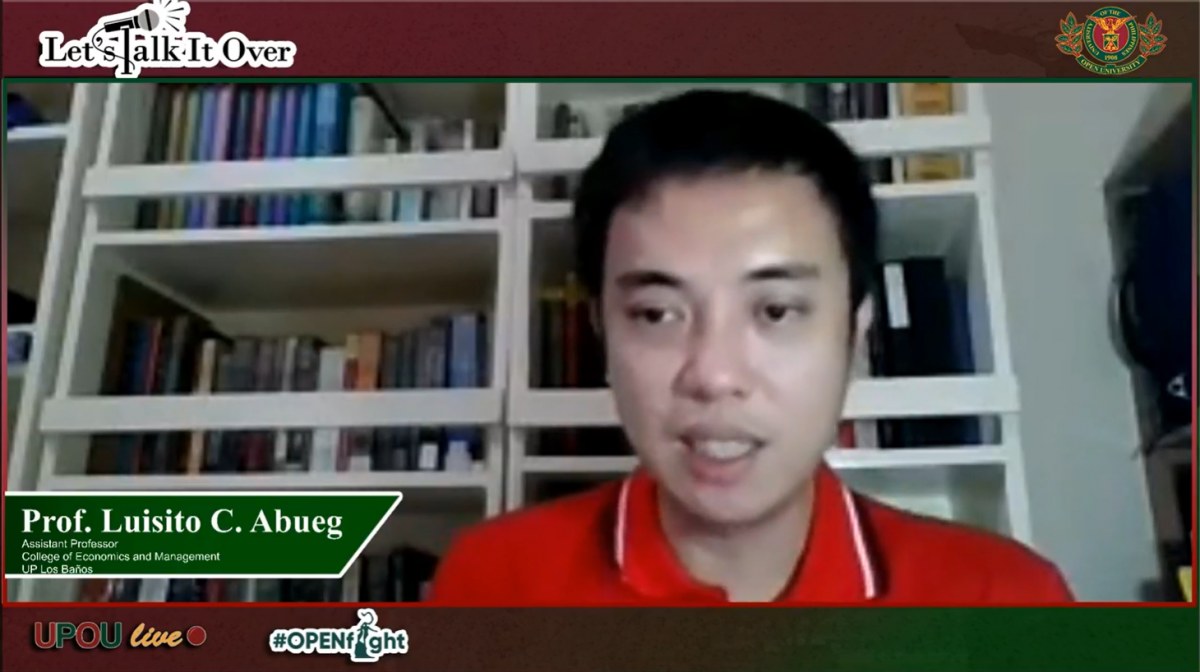
Prof. Luisito Abueg, assistant professor of Economics at the University of the Philippines Los Baños (UPLB), started the discussion with a situationer on how the COVID-19 pandemic has contributed to the plastic waste generation problem in the Philippines. He showed different reports about medical wastes, such as single-use face masks due to the pandemic, ending up in oceans as marine litter.
In his presentation, Prof. Abueg cited a 2016 report by the World Economic Forum stating that an estimate of 78 million tonnes of plastic is annually produced by the world. Thirty-two percent (32%) of these end up in the oceans, while only 14% are being recycled. Of the 14% that are recycled, only 2% are reused as packaging materials.
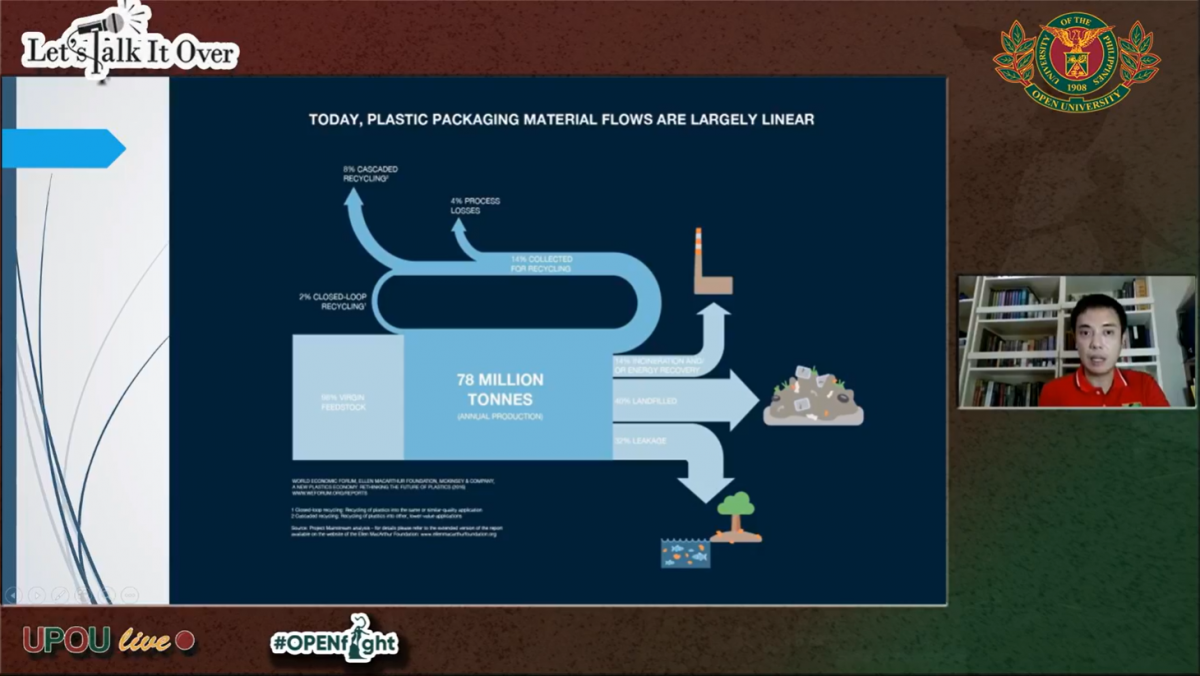
“Scientists are projecting that if such trend continues, by 2050 there will be more plastics than fish in the world’s oceans,” shared Prof. Abueg, as he also emphasized that these data were still a conservative estimate since these were collected in 2016 when there was no pandemic yet.
In addition to these, Prof. Abueg shared that an estimated 1.4 trillion single-use plastics are produced every year, and the Philippines is ranked third in the six top-contributing countries in the world.
“We Filipinos are guilty of this, because most of our activities would involve the use of single-use plastics,” remarked Prof. Abueg.
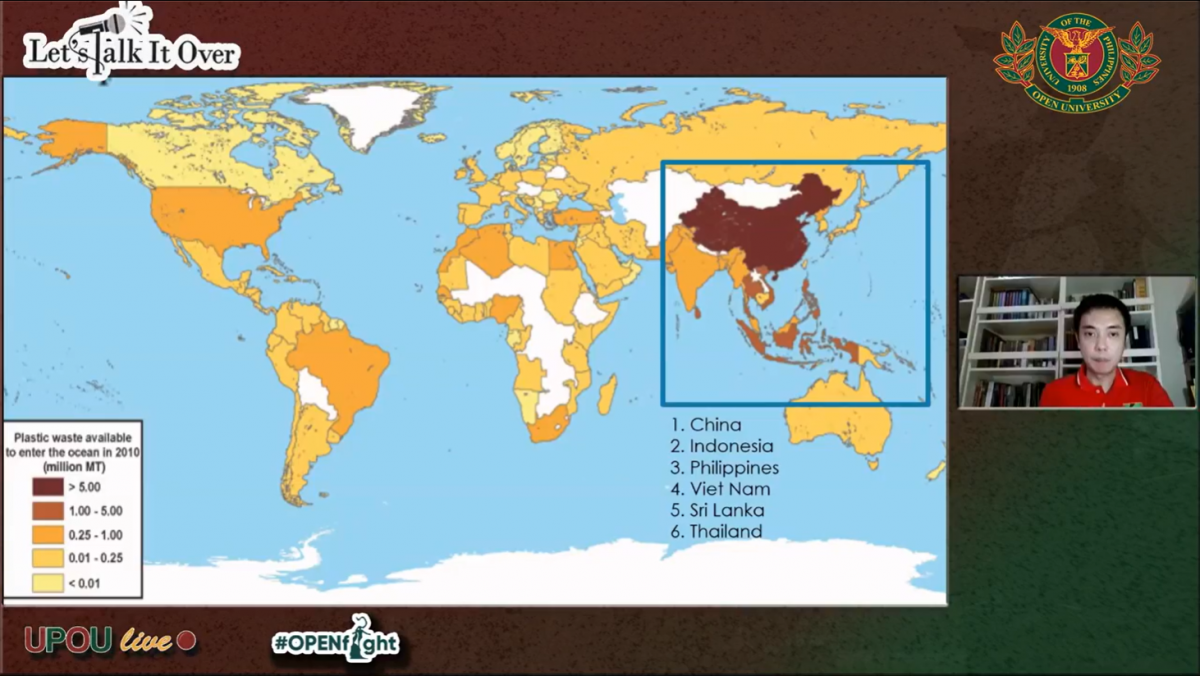
An increase in plastic material production was highlighted during his lecture, due to the increase of activities that demand its use during the pandemic. These include packaging from online shopping and food deliveries, transport makeshift barriers in public transportations, and disposable surgical masks and personal protective equipment (PPEs).
Prof. Abueg shared a report from the United Nations Environment Programme (UNEP), which stated that using historical data, 75% of wastes accumulated from pandemics pile up in landfills and oceans and costs USD 40 billion to tourism, aquaculture, and fisheries.
The second session of the webinar was led by Mr. Jefferson Chua, corporate campaigner of Break Free From Plastic (BFFP) Philippines – a global movement of organizations and individuals working towards a future free of plastic waste pollution. He talked about advocacy perspective to the problem of plastics and explored solutions about it.
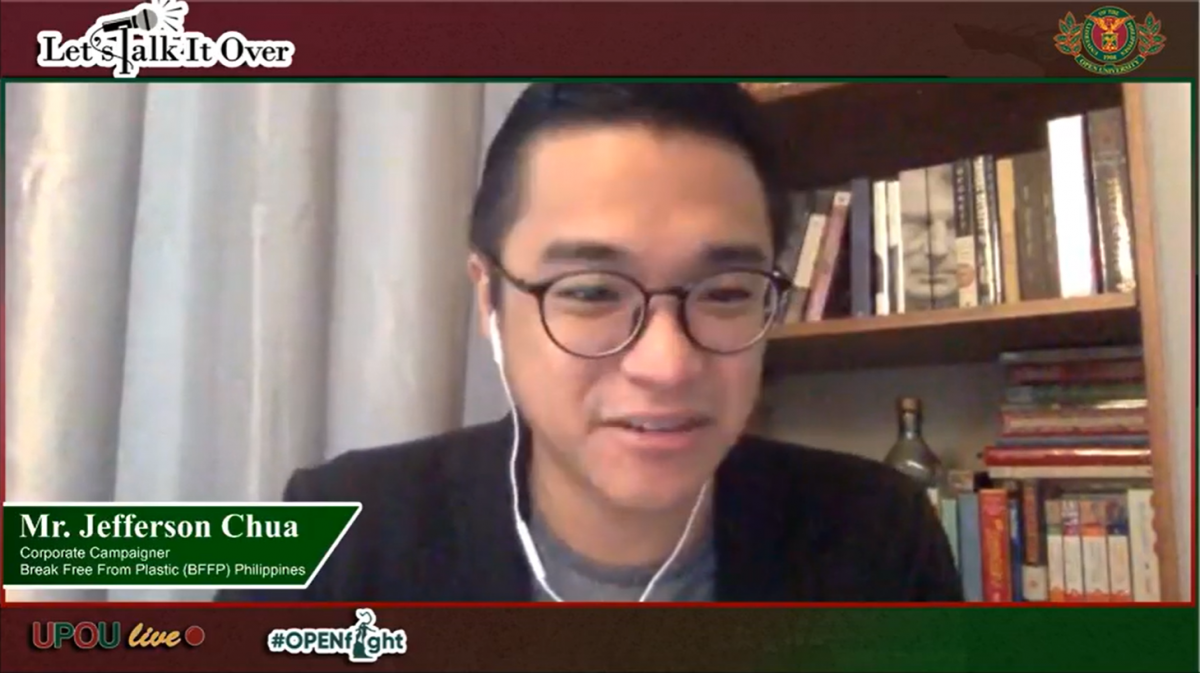
Mr. Chua started his lecture by identifying the three major root causes of the plastic pandemic from an advocacy perspective: 1) unchecked corporate practices, 2) shortsighted company and government policies, and 3) false solutions and greenwashing.
As elaborated in the webinar, unchecked corporate practices include opaque company reporting or lack of transparency in disclosing the amount of wastes that companies produce; passing the blame on to consumers or lack of accountability in production wastes; and unfettered capital accumulation. Meanwhile, the second root cause – shortsighted company and government policies – refers to vested interests, ignored constituents, and low implementation rate of environmental policies.
“The Philippines is a land or a country that has really good environmental laws but [with] really bad implementation practices and rates,” shared Mr. Chua as he described the usual narrative about the Philippines in terms of environmental management. “There are frameworks, there are good ideas behind the laws, but they’re not implemented properly.”
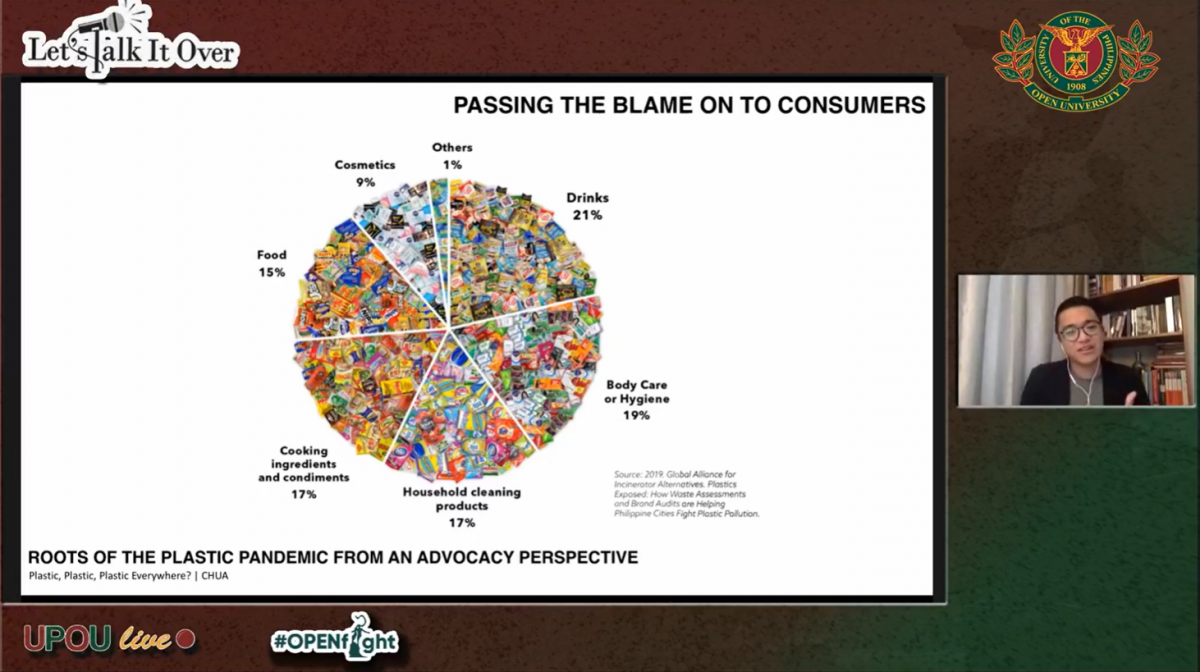
Mr. Chua also addressed false solutions and greenwashing as another root cause of plastic pollution. These include recycling industries, waste incineration, and the rise of “eco-friendly business model”.
“We see how the recycling industry lobby has had a huge effect in how we understand plastics, and how we understand our relationship to these plastics,” said Mr. Chua as he discussed how lobby groups, such as Keep America Beautiful, Inc. – a fossil fuel-funded lobby group – have put the blame on consumers and have promoted false community efforts of clean-ups and eco-bricking. “It doesn’t go to the root of the problem, which is production of plastics at its source. Because of this, ‘environmentalism’ becomes a hollow effort of cleaning the surroundings and individual responsibility.”
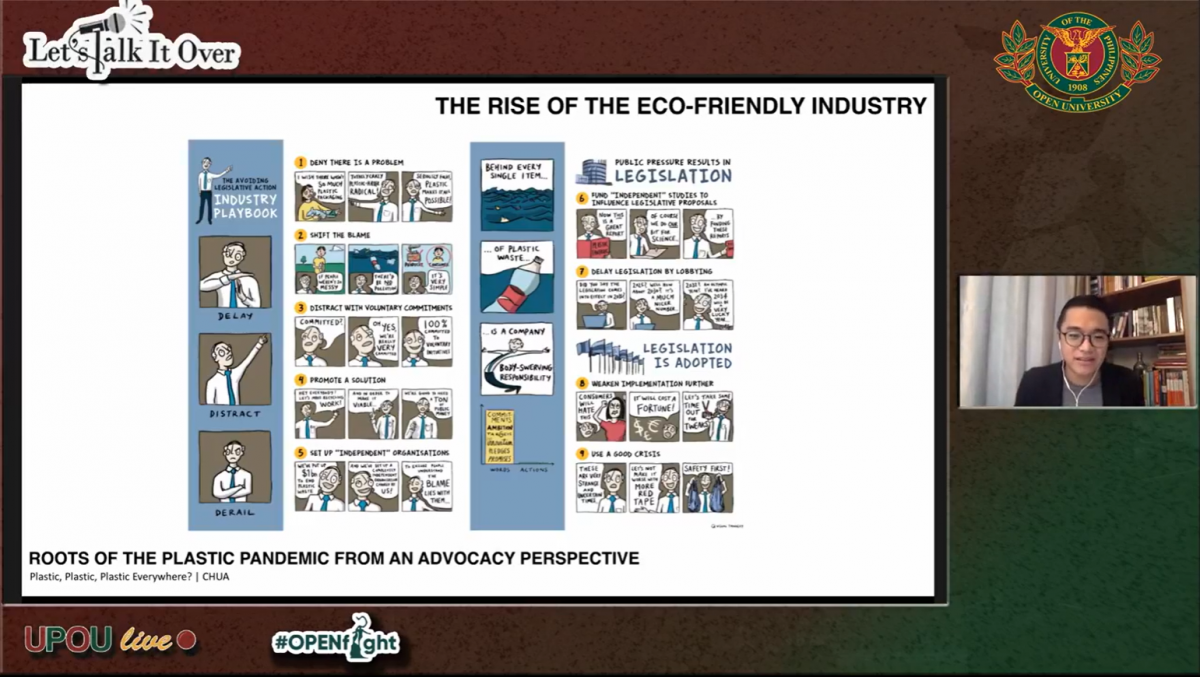
In his presentation, Mr. Chua shared some solutions to the problem of plastics. One is by demanding and capacitating corporate accountability through waste and brand audit, which would not only “strengthen the message against large corporations, but would also educate the communities how they have been victims of corporate greed through plastic waste.” The other solutions are capacitating zero waste and refilling initiatives, looking at historical traditional community practices, and rationalizing plastics use.
“We don’t use our PPEs when we don’t go out. We use less plastic if we don’t go out. We don’t throw these surgical masks away because we don’t use them, since we’re in our own homes,” he explained in rationalizing plastic use during the pandemic.
Mr. Chua concluded his lecture by sharing the importance of recovering the value of community in solving the problem of plastic pollution, “For the longest time, this pandemic, this problem has always been a problem of capitalist individuality. What we need to do is to counter that by going back to what we mean with community, by asking who is our neighbor, and seeing how we are all responsible for a better world.”
The webinar also held an open forum moderated by Prof. Consuelo Habito, chair of the D/MENRM program.








